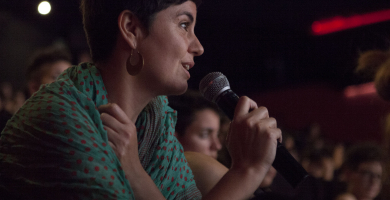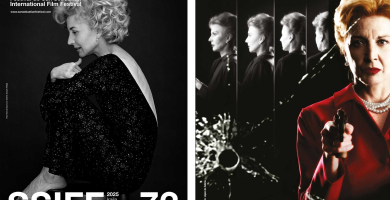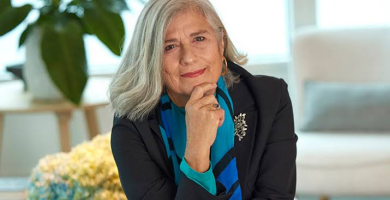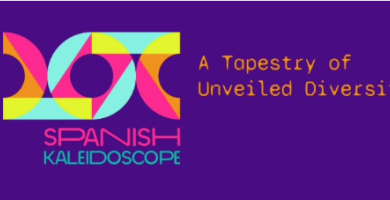
MARÍA ZAFRA: “WOMEN HAVE BEEN PRESENT IN CINEMA AND IN THE CREATION OF AUDIOVISUAL CONTENT SINCE THE BEGINNING AND THIS HAS BEEN SYSTEMATICALLY ELIMINATED BY THE PATRIARCHAL SYSTEM.”
This month we interview María Zafra, a programmer of the International Women’s Film Festival. The Festival created a necessary and very important space to reflect on and see films made by women, a space which did not previously exist in Barcelona. Next year will be its 30th anniversary. We talk with her about the festival in general and about this year’s edition which has just passed its halfway point.

How and why was the Women’s Festival created?
It started in 1993 with the idea of vindicating the genealogy of films made by women. It was a time of great focus on Women’s Studies and the feminist movement which came from the 60s and 80s in order to vindicate the genealogy of what women had done since the early days of cinema. The idea that a few women have occasionally done a few things is not true. Women have been present in cinema and in the creation of audiovisual content since the beginning and this has been systematically eliminated by the patriarchal system. The Women’s Film Festival began with this intention of vindicating and recovering this genealogy.
Many people see films made by women and think: films for women, and this isn’t true. There is this prejudice which says that what men do is considered to be universal, but that what women do isn’t. Have you noticed a change in audiences over these years? Is it a more diverse audience and not just women who go to the Festival?
I must say that it’s still difficult, but that over the last few years, with the explosion of the feminist movement and perspective everywhere, it has begun to be easier. We’re very happy because a question the media always asked was: what is the point of a women’s film festival? They haven’t asked that in recent years. It makes me happy, because it means that part of the discourse has already taken root and we can begin to take it further.
Despite the fact that we have done in-depth work to create and recover this knowledge, there was then the pick and shovel work with the media and the administrations. Apart from the audience, I think the most difficult was the administrations and the media which year after year continued with the same arguments. That is changing now. We are well-established as a festival, we have screening spaces and a consolidated audience. It’s not just the same audience which has followed us for 30 years. Those women are still there, but there’s also a very young audience which is growing and changing. This is very enriching for us.
Next year will be your 30th anniversary. Apart from what you mentioned, what other challenges do you still encounter on organizing a new edition of the Festival?
Rather than organizing a new Festival, the biggest challenge that we currently have is the archive. How do we conserve everything we’ve recovered? We have a huge archive of films that we have shown over the years, but there are also other archives. For example, we have the archive of the first feminist film festival in Madrid, which took place in the 80s. They gave it to us to conserve it, because they didn’t exist any more as an association and they couldn’t keep it. We have archives of things which do not exist anywhere else and now the challenge is how to maintain it and to make it accessible. If it’s not accessible, we go back to what we said about being eliminated.
It’s as if it doesn’t exist.
Exactly.
You recover cinematography which often doesn’t reach us through the usual channels. Do you always look for a different outlook with your proposals?
We don’t have a single outlook. We try to have a diverse outlook and also to recover certain figures. For example, this year was the almost complete retrospective of the work of Dorothy Arzner with the Filmoteca de Cataluña, which was wonderful. A director from the 30s in classic Hollywood with the big stars. We also paid tribute to Cecilia Mangini, an Italian woman who died this year. We offered her a retrospective in 2011 and she was here with us. She was a committed, left-wing documentary filmmaker who made very special films. Not at all like Dorothy Arzner. We like to recover very diverse, creative women, who were important in audiovisual creation from the start until now.
You are a programmer of the Festival. What interests you as the programmer of a film? What makes you take it into account when making the selection?
It can be many things. One fundamental element for me is that after a few days it still resonates with me. It can be a very small film, but you’re in the kitchen doing something else and it comes back to you. This is important; it means there’s something special with this film. We have many criteria indicating what we don’t want. That’s very clear for us. The limits of what doesn’t interest us as regards representation and creation. What does interest us is more complex. This year there are four of us making the selection. Marta Selva and Anna Solà (directors of the festival for many years), who continue offering advice to the Festival and it’s a pleasure to still have them with us, Marta Nieto and me. We are very different people and the programming conversations and discussions are extremely interesting. There are more rational arguments and others which are absolutely emotional about what the film provokes in you. And with this we gradually see what’s available.
Unlike other festivals which only take place during a certain period, the Women’s Film Festival extends throughout the year. Why did you decide not to concentrate the programming on a few specific days? And what have you gained with this change?
We thought that with the format of everything condensed into the same days on one week, you ended up counter-programming yourself, because you had a screening at the Filmoteca at the same time as a round table in the Bonnemaison. This is impossible for the audience and for the festival team. We decided that we wanted to do something more accessible and with more possibility for the audience and for us to enjoy it throughout the process. That’s what led to this elasticity of time, and we now do programming from March or April.
This year we began in February with the sessions at the CCCB on Margaret Tait. We have a programme for practically the whole year until December. It’s true that the first week of June, which is our historic week, continues to be at the centre and the heart of the festival. This is when we bring directors, guests, … It’s a time to meet the audience more and for people to identify as the week of the Festival.
With the pandemic situation, last year you decided to have the Festival on line and this year you’ve returned to the screens of the Filmoteca. How did the pandemic affect you? And what does it mean for you to make the online leap thanks to Filmin?
The pandemic affected us precisely in May and June which is when we have the highest volume of programming. In March, when the restrictions and lockdown began, we had to change directions very quickly. It was a little crazy but, thanks to Filmin, which has an incredible team, we were able to do it. It was also a very enriching experience to go on line. We could access an audience in the whole of Spain and this was very nice. As regards numbers it was incredible; they shot up, but I believe it’s to do with the fact that people were stuck at home. We don’t want to take these audience numbers as the real situation. We have to assume that it was a very special circumstance, but the audience response was amazing. We received messages from all over the place about the programming and this was very nice in what was a terrible year, on losing cinemas and the talks after the screening with the audience, which for us is the most important aspect after the programming. What you want is to share it with the audience, for them to talk to you, discuss it and criticize. We lost all that. The online interviews with all the directors were also very emotional. I think the audience really appreciated it. It was a very difficult, but also very enriching experience.
This year we’ve returned to a face-to-face format; we’ve maintained part on line and we’re looking at how all this works. It’s a balancing act and we’re looking at how we’ll continue, what decisions we make voluntarily, after the response to the situations imposed.
You’re already half way through the Festival. How did the first part go? Did the audience respond despite the situation that we are still going through?
The audience is finding it difficult to go back to cinemas. Other festivals, cinemas and the Filmoteca all say the same. Even so, it’s true that the response by the Festival audience has been very good. And it’s been a pleasure to meet in person again. We did the sessions at the CCCB on Margaret Tait, the session on a thinker with Remedios Zafra on cyberfeminism in April in the Girona cinema and also the sessions on Latin American Documentary Filmmakers there. Afterwards, all the Filmoteca sessions, others linked to the Archipiélago project and some on female filmmakers who talked about the work of other female filmmakers. And this all went very well.
As you mentioned, this year you offered a retrospective devoted to the director Dorothy Arzner, a Hollywood pioneer from the 30s. Despite the fact that she was very well-known in the 30s and 40s and was championed by the feminism of the 60s, the general public does not know her. How did this retrospective arise and what difficulties did you encounter on bringing it to fruition?
Each year we come to an agreement with the Filmoteca on a retrospective on a female director and we wanted to do the one on Dorothy Arzner in 2020, but we had to stop because of lockdown. And this year, we almost didn’t do it, because the majority of the copies that were screened were originals in 35 mm and were in United States archives or universities which were physically closed. There was a time when we weren’t sure whether we would be able to receive the physical copies from the States. In this respect it was complicated. You realize the difficulty in moving things which you took for granted before.
You also have two annual creation calls, El video del minuto (The One-Minute Video) and the Archipiélago Project. Can you explain a little what they consist of?
We do the one-minute video with Trama, the Spanish coordinator of video and film shows and festivals and it began about 15 years ago. We launch it each year so that women from all over Spain can make a one-minute video on a subject that we propose. This year it was cyberspace. It’s a call that we’re very fond of because women really enjoy it; its great fun and inspiring. We also offer workshops linked to the same with groups of women with which we work on this proposal. How do you make a one-minute video on a subject? What strategy can you use? It’s very creative.
The Archipiélago Project arose when we celebrated the 25th edition and we proposed an open call for female filmmakers, artists, students, creators in general who wanted to produce a piece, which could be a video, photograph, text, gif,... in tribute to another female filmmaker. With this we have gradually constructed a virtual archipelago which is accessible from the Festival website, and where each island is a female director to whom tribute has been paid. It’s a project that I’m really fond of and the pieces we receive are wonderful. This idea of constructing genealogy together really takes shape in this archipelago.
Over these summer months you’re immersed in the Cine fuera de lugar (Films Out Of Place) cycle. How is this experience with outdoor films in the city’s streets going?
The sessions are going quite well; it depends a lot on the neighbourhood. It’s always a bit of a surprise, because often it’s more to do with the people who pass by the space at the time. The one we did in the Virreina went very well. It was a very special session, in which we screened the Australian film Terror Nullius, a film which appropriates material and constructs a whole narration starting from films such as The Adventures of Priscilla, Queen of the Desert and other mythical films. The following week we did a session in Nou Barris with a selection of short films by the coordinator Trama called Cortos en femenino (Female Shorts). And in the last week of July, the screening in the square of the Filmoteca. So far it’s gone very well and we hope it continues like that. Also, all the changes to the restrictions mean that people don’t really know what to do.
You’ve also gone beyond Barcelona with La Mostra se mueve (The Festival Moves). How did this initiative arise?
From the Festival, and also Drac Màgic, which is the organization to which it belongs. We programme many events and activities throughout the territory. We like to take the programming and the activities beyond the centrality of Barcelona. It’s something we’ve always defended. Accessibility to feminist cinema made by women cannot be enclosed in the city of Barcelona. It must be able to reach other places. We’ve been to many municipalities and the audience is responding. People are very grateful.
What’s left to see in the second half of the year at the Festival?
The Conocidas (también) en casa (Well Known Women (also) at Home) programme, a selection of films by female Catalan directors or those established in Catalonia which we take to different municipalities of the territory and also to prisons. We do these screenings with the presence of the director. It will be from September to November. Then we’ll have the seventh edition of the Manifiestos fílmicos feministas (Feminist Film Manifestos) in November at the CCCB. And the presentation of the Archipiélago project in December, which we normally do in the Zumzeig cinema, with the pieces which have been received in this year’s call and looking a little at the whole path of the Archipiélago process.
And next year is your 30th anniversary.
Yes. We’ve already thought of many things and we will explain them little by little. We hope to be able to do them in a normal situation and to enjoy them together, with many encounters and moments of joint celebration, even with a celebratory drink.









